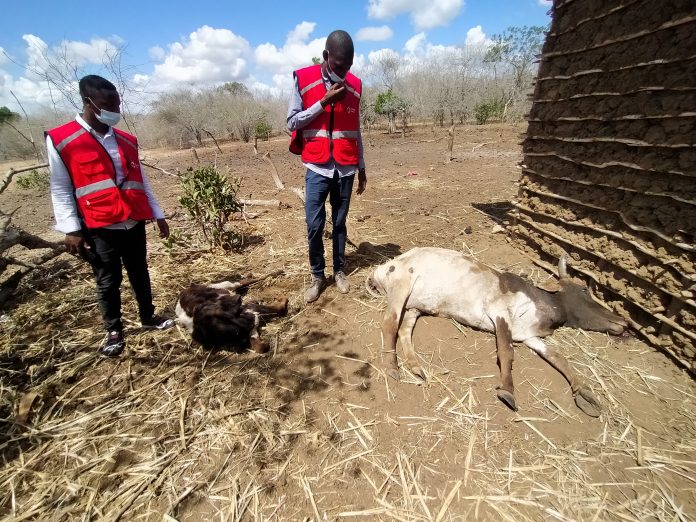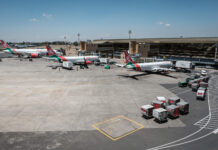Kilifi County is now experiencing the worst drought in its years, a situation that led to uncertainty of life for the residents.
The drought situation has so far affected over 2.14 million Kenyans countrywide and its worsening in Kilifi County which has over 145,000 people affected after the area recorded poor rainfall for the last two years.
So far animals have begun to die in thousands due to lack of grass and water and there are fears that people may start losing their lives if action is not taken soon.
The affected people are in dire need of relief food and among them are 376,000 people affected from the Coast region alone.
Magarini is one of the sub-counties highly affected by the disaster in Kilifi county followed by Ganze, Kaloleni, and some parts of Malindi.
A report from the Ministry of Devolution and ASALSs said a multi-stakeholder team led by National Drought Management Authority (NDMA) undertook an assessment of the drought and food situation of the country with a view to assessing the interventions they have been taking and gaps that need immediate and medium-term interventions.
The report by NDMA stated that the number of people could rise from 2.14 to 2,366,500 if the October-December short rains are below-normal
“Out of this, about 354,600 people are in an emergency (Phase 4) while another 1,793,200 are in crisis (phase 3) thereby falling within the ambit of people facing high acute food insecurity and therefore require urgent action. The assessment also revealed that 5,214,200 are stressed (Phase 2).
Also Read:
- Student Hospitalized After Sneaking Into Girls School
- Former Tetu MP Charged For Assault Over Watchmen
- Bus Employee Charged With Raping Nazarene University Girl
The report states that counties most affected include Turkana (370,000), Wajir (195,000), Mandera (173,000), Garissa (168,000), Marsabit (160,000), and Kilifi (145,000).
Journalists toured the sub-county with Kenya Red Cross officials on an assessment mission today and came face to face with the reality which is evident after past the Sabaki bridge along the Sabaki, Marafa Baricho road as farms are completely dry with no crops.
Water pans in the area have dried up and people have to buy water at Sh. 10 while domestic animals have no water.
At Gandini area, we find one several cattle had died and others were very weak and are in the last stage of life due to lack of grass and water.
We learn from the local assistant chief James Lewa that over 600 cattle heads have died of hunger and the numbers are rising each day.
In one of the homestead, two cattle were dead, one was in its death stage and a woman was trying to feed the calves with water as their weak mothers cannot breastfeed them.
Mr Lewa said the drought started last year and this year the situation worsened because there are many animals that died.
“One family lost 53 cattle it is the largest household that
At Sosoni area I find Margaret Kinana Katsetese a mother of three watching over the cattle “feeding’ on a farm with no grass and the entire landscape is empty as the trees also dried up.
Katsetse said the drought has persisted for a long time and it rained in Mid May after she had spent Sh. 7500 acres to pay for a tractor to till her three acres of land.
Unfortunately, she said the maize did not germinate as the rain was short and to date, there is nothing on the farm.
“Animals have no grass because of the drought the few grass that was available is finish now they are very weak and some are dying,” she said.
The mother of three said there is a famine for both humans and animals and expressed fear that the situation will be worse in the next few months.
Also Read
- Taliban vow to be accountable, probe reports of Afghanistan reprisals
- Kilifi Women Rep seat attracts MYWO chair Witness Tsuma
- President Uhuru’s Imposter Arrested By DCI
She said the county government of Kilifi has not supported them with anything in regards to the pandemic.
“Animals have started dying those that were here had to be transferred to another area called Majengo, they agreed with the village elders in the area to be allowed to graze there,” she said.
Debora Mali a mother of five from, Sosoni said the biggest challenge is getting animal feeds as everywhere is dry.
Currently, she said they have been forced to buy grass for her cows and food for her children which is expensive and soon may not be able to afford.
“Children want school fees you cannot sell the animal because it’s weak, both me, my family, and the animals have no food,” she said.
Mali said she already lost one cattle and showed us a neighbor’s cattle which is also in critical condition and feeds only on dry grass as it has no strength to walk for the long-distance others go to get grass.
She said currently she buys grass from River Galana banks and it’s expensive because it’s very far adding that the situation is getting worse daily.
“I planted four acres the seeds germinated but due to lack of rain the crops dried, recently I planted again but they dried up again,” she said.
Also Read:
- Student Hospitalized After Sneaking Into Girls School
- Former Tetu MP Charged For Assault Over Watchmen
- Bus Employee Charged With Raping Nazarene University Girl
She said the county government of Kilifi has also not offered any support and called on the authorities to provide animal feeds and relief food for the residents.
Peter Yeri Kombe the assistant chief of Wakala Sub location in Bungale said the drought situation is worse as all the water pans have dried up as there were no rains.
He said they have lost over 1300 domestic animals since the drought hit the area and those still alive are in a bad state as they cannot go to search for grass.
“We have organized with some other chiefs in Dagamra area to allow our residents to go and graze there to prevent their animals from dying,” he said.
He said all the 1000 households in his sub-location have been affected and have no food adding that their prayer is to get short rains.
Children he said have now been forced to skip classes particularly those majority which has no school feeding program.
Agnes Mkutano Kadzomba said the drought has persisted and their major challenge is how to access water.
She said they can stay up to one week without water as the water pan they constructed dried up.
“We did not harvest in the last three seasons due to lack of rainfall, now to get water there is a tap but the water comes two days and stays for a week without water,” he said.
Kadzomba said they initiated a pipeline project to ensure they get tapped water but due to hunger, they cannot do the work.
Mtumishi Shungu a local pastor in Bungale said they have never witnessed such famine in the last 50 years.
Also Read
- Taliban vow to be accountable, probe reports of Afghanistan reprisals
- Kilifi Women Rep seat attracts MYWO chair Witness Tsuma
- President Uhuru’s Imposter Arrested By DCI
Shungu said farmers are disappointed as they invested heavily on the land to hire tractors and buying seedlings but after planting nothing germinated.
“We appeal for help from all well-wishers and good Samaritans to help us with seeds so that in case it rains people can plant, we also need food because there is nothing completely at home,” he said.
Currently, he said there are human-wildlife conflicts cases on the rise as recently there was a lion that was threatening the lives of people together with snakes and other dangerous animals that are looking for food.
He said the lion killed four goats and there was a case last week over the same as the owner incurred losses which are all caused by the drought.
The report stated that the most affected are Turkana, Kilifi, Mandera, Garissa, Wajir, Marsabit, Baringo, Kitui, Isiolo, Tana River, Kwale, Kajiado, Narok, Lamu, Samburu, Makueni, West Pokot, Laikipia and Taita Taveta counties.
Other affected areas include Meru North of Meru County, Kieni in Nyeri county, and Mbeere in Embu County.
*This article was written by Ramadhan Kambi for Uzalendo News. Email: uzalendonews24@gmail.com to submit your story.



















